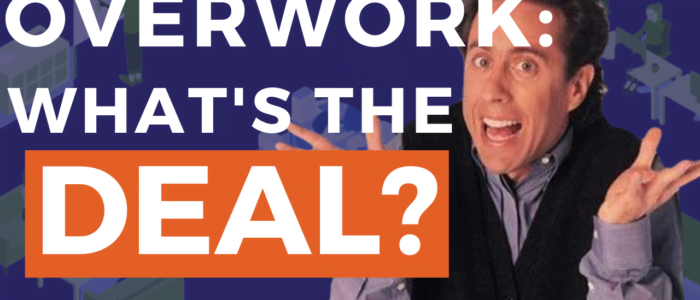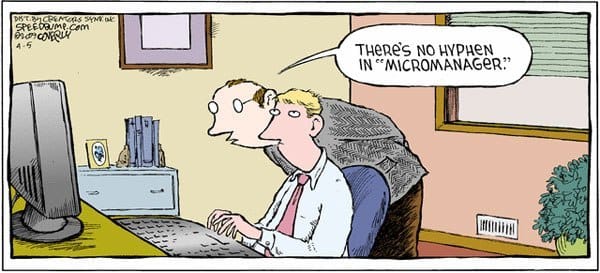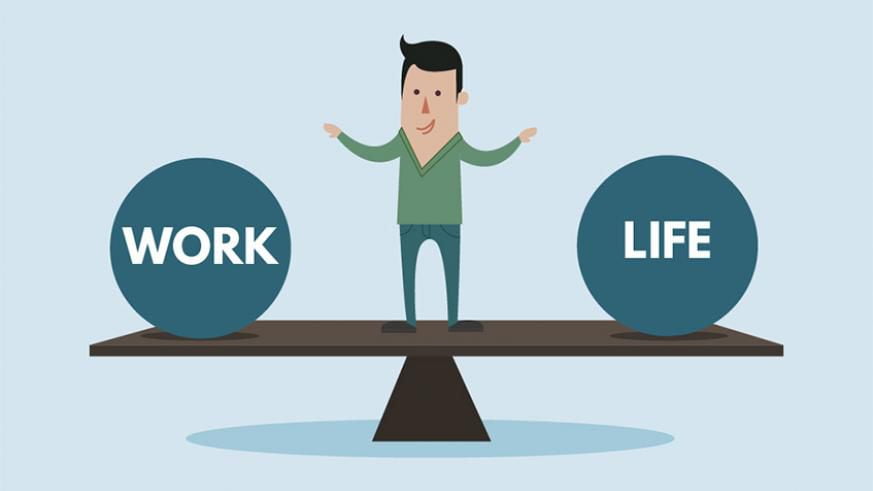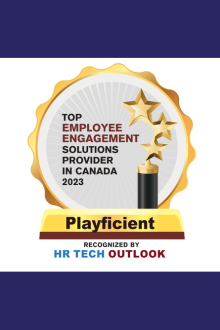Why Does Overwork Still Exist In The Workplace?
What’s the deal with overwork still existing in the workplace?
Sounds like the start of a Jerry Seinfeld joke. Sadly, it’s no joke. Dealing with overwork has happened throughout human history, the shape it takes evolves as our world continues to change.
Want to watch have this post in video form? Here’s a video on the subject from our YouTube Channel!
It’s funny to look at the prediction of economist John Maynard Keynes on the future of work.
Back in the 1930s, he predicted that his grandchildren would be working just 15 hours a week thanks to technology. That, of course, did not turn out to be the case.
To be clear, I’m not saying that thanks to technology (and with the rise of automation) that we shouldn’t be working altogether, or be lounging all day on beaches (go watch Wall-E to see a possible future). Work is an important aspect of our lives. It’s in our blood, our DNA. It helps give meaning to our lives. There is a reason that death rates spike after people retire.
That said, while we can produce more per person more than ever (and exponentially more with the rise of computers during the 20th century), organizations are expecting more, and always more. More profits (to the owners of course, and not towards raising salaries), more consumption, and, of course, more work.

Little off the mark John.
Consequences Of Overwork In The Workplace.
Workplace stress has been on the rise. From Korn Ferry Institute:
The largest source of current stress: bosses. The survey shows 35% of the respondents say their boss is their biggest source of stress at work, and 80% say a change in leadership, such as a new direct manager or someone higher up the organizational chart, impacts their stress levels.
The new survey results are more confirmation of stress increasing in the workplace. Indeed, employee stress levels have risen nearly 20% in three decades.
Workplace Stress Continues to Mount
In Japan, there is the term “Karoshi” which translates to “overwork death”. Japan has long faced issues with being overworked in the workplace, and has had an impact on the economy, and the birthrate, for the worse.

Japan has a reputation for overwork.
The Technology Factor In Overwork.
We have seen technology open new possibilities for how we work. People can work from home, or on a beach in Thailand (those lifestyle bloggers sure love to play that one up). You can get in contact with nearly anyone, at anytime, on any little thing, whether through email, instant messaging, or video messaging.
Yet, this means we are now able to be in contact at any point when it comes to work. In the past, you could leave work and be done with it. Sure, you could be reached on your landline, or your email if you decided to check it, but if people needed to stay later in the office, they would just do that. Else, things could wait until the next day.
How are things now? There is a rise in organizations where there is the unwritten (and sometimes written) expectation that people need to keep track on what’s going on after office hours. This could be through Slack, or through email. Some managers expect people to respond after-hours.
What you end up with is being overworked where people are expected to be on call at all hours. Unless it makes sense (for example, an emergency doctor on call, someone on call in case the servers go down), there are very, VERY few situations where things couldn’t wait until the next morning, or after the weekend.
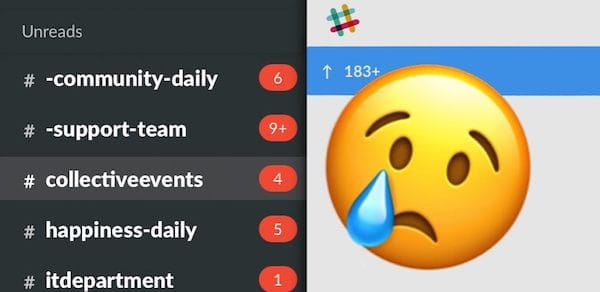
The dreaded Slack overload.
The Atlantic has a great article on how the laptop was the main culprit in killing work-life balance.
How Your Laptop Ruined Your Life
Let’s look at how leadership contributes to overwork.
We have plenty of leaders that put hours upon hours into their organization. It’s their baby, or they are in a position of power where they are the babysitter. They want to care and nurture it, and that’s fine. If they want to put in the long hours because they love it, then by all means. Some people are simply wired that way.
It’s a safe wager to guess that their main play personality is the competitive play personality (I’ve written about the eight play personalities in the workplace here).
The issue arises when leadership expects the same of everyone else and you end up with others being overworked in the workplace.
If people aren’t spending long hours in the office, it’s clear they don’t care and that they’re lazy. Yet, that’s not true, not at all. Yes, for some people, they are just coasting and in it for a pay-cheque (I’m sure we’ve all been there at some point in our lives), but for others? They put in their time and energy at work (which they enjoy), but they also have their lives beyond their workplace and their employer. Not everyone is wired to be workaholics like some leadership teams are, and there is nothing wrong with that.
Let’s look at this tweet from Elon Musk that got him in hot water in 2018:
If Elon wants to work 100+ hours (which he does on the regular), that’s his choice. It’s clear he loves it and what he does is his passion. That’s fine.
However, when he expects that of everyone else, that’s where issues arise. In the end, you end up burning out quality, talented people who leave for greener pastures, and the cycle repeats with new people coming in. For him, he’s created organizations where people will sell their soul, their firstborn, and their left kidney to get a chance to work at (even just to get it on their resume and leave after a year or two).
Granted, it’s always been the case throughout human history where leaders are frustrated that people aren’t working as long or as hard. But as I mentioned earlier, with the rise of technology, where people can be reached anywhere, and at anytime, that overworked culture continues to seep in. Unless we address it, it’s only going to get worse.
The next trickle down factor occurs when leadership passes down being overworked to management.
I’m sure you’ve heard it a million times over that people don’t quit their organization, they quit their manager. I’ve had managers who got into roles that they were not a fit for. That’s not to knock their work – they did great work before, but management wasn’t their thing. You might have ended up in the same situation.
There was one time I was having a meeting with someone, face to face. Computer was closed, phone elsewhere, just having a good chat. I get back afterwards, find several messages on slack, and a missed video call from my manager. A missed phone call, and a text.
What was it?
Something minor, but he seemed so frustrated that he couldn’t reach me for about 40 minutes. I I set my boundaries after that, and this was at an organization with 1000s of people. I was fairly new – what was I going to do? The organization wasn’t going to burn to the ground if I didn’t get back to him right away, despite what he may have thought.
Currently as of writing, unemployment is very low.
*Update March 23rd 2020: Well, with the Coronavirus, let’s keep an eye and see how this plays out.*
As an employee, you have options. Dealing with overwork? You can seek employment elsewhere. I’m not saying you jump every 7 months as soon as some minor things come up, but you’re in a time where you have this option. Take advantage of this – it’s an employee-driven world, so you can find a place that is a better fit that doesn’t delve deep into overwork.

I do enjoy that this is the first result while searcher greener pastures
Setting Expectations Around Workplace “Fires”.
I don’t mean literal fires, but figurative ones.
We’ve all been there – something needs to be done right now or else. We can’t wait until tomorrow, or after the weekend.
I don’t want to discredit your work, but how many situations have you been in where that if you didn’t get back to something right away, or wait until tomorrow, or sleep on it, that the organization would cease to function?
I’m sure that’s 0.000000000001% of situations. Even for leadership.
I did mention earlier that there are exceptions (emergency doctors on call, IT workers on call in case the servers crash), but this is the exception, and not the norm. Sadly, management and organizations tend to make it otherwise.
Before Obama authorized the raid that killed Bin Laden back in 2011, he slept on it. Do they bomb the area and take down civilians, or go more risky and do a raid on the compound? That’s a pretty large decision, yes? If he can do that, I’m sure your organization can do so as well.

This is what managers think will happen without micromanaging…guess what? It doesn’t happen.
Your organization needs to set boundaries.
I’ve talked about this on my post about loneliness in the workplace. 37Signals have a great article about the importance of setting boundaries of use of group chat.
37signals: Is group chat making you sweat?
In 2017, France made some changes to the law to give workers the right to disconnect.
French legislator Benoit Hamon, speaking to the BBC, described the law as an answer to the travails of employees who “leave the office, but they do not leave their work. They remain attached by a kind of electronic leash—like a dog.”
New French Law Bars Work Email After Hours
Did the world end? No. Did organizations burn to the ground? No, they didn’t.
Set boundaries at your organization to help prevent the overworked culture from emerging or growing.

Guess what? It can wait.
Be Upfront About Your Workplace Culture.
Organizations need to be more upfront about their workplace culture. Do you expect people to be putting in long hours, and checking Slack off the clock?
I don’t agree with this whatsoever, but if you do, make these expectations clear upfront.
Noted overworked organization Amazon has made it clear – from Jeff Bezos:
“We never claim that our approach is the right one — just that it’s ours — and over the last two decades, we’ve collected a large group of like-minded people.”
I’ve made my thoughts about Amazon’s focus on customer experience to the detriment of the employee experience in the past (read about it here), and I’m not saying that you should copy Amazon (part of the FAANG Effect which I’ve written about), but I do appreciate how they are upfront about their work culture.
Some thrive there and stay for years, and many others leave after a short period of time.
Here is a passage from the excellent book GOOD TO GREAT, which I have on my recommended reading list for business books on culture:
The last thing I want your organization to be is to not be upfront. That causes resentment and turnover. That won’t be for everyone, but it’s better to be a upfront and a polarizing culture and set clear expectations.
Here’s a great video on the value of having a polarizing workplace culture:
The Work-Life Balance Factor.
Ah, work-life balance. Such a delicate subject.
While I can’t seem to find the article or quote anymore, Richard Branson had a great thing to say about it.
If organizations are expecting people to be doing work after hours during their own personal time, than employees should be allowed to take personal time during their workdays.
I really like that idea. If the shift has occurred and you are expecting people to put in time outside of the office, they should have the right to do so with their personal lives while at work.
I’m suggesting you let people go run five-hour errands, but be flexible about this.
Looking for tips on work-life balance? Here’s a post I wrote on six tips for working from home.
Conclusion.
There’s no easy answer to overwork culture.
Well, there is, and that’s setting boundaries, and working less.
Yet the problem arises is when leaders are glorified for answering emails 20 minutes after giving birth or saying the following:
Yahoo’s Marissa Mayer on Selling a Company While Trying to Turn It Around
Again, if people want to work that long because they love it, that’s their call. However, very few are wired that way. They can’t expect the same for everyone.
My goal with this article has been for you to give thought on overwork.
Maybe it exists in your organization. I’ve been fortunate that prior to founding Playficient, I encountered very little of it. Yes, there were leaders or managers who did so, but I set my boundaries.
With the rise of automation (and that is a whole different ballgame of what can happen as a result), we can very well seeing greatly reduced hours…or it might be the cases like John Maynard Keynes’ guess going awry. Perhaps with us working with more automated machines, we will be expected to produce even more and work just as hard.
If you’re struggling to address overwork in your organization, we at Playficient can help you out.
We have three core offerings for organizations:
Thank you for reading. Hopefully you’re not being overworked in the workplace.

